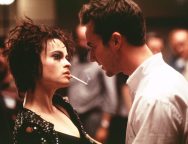| Fight Club |
| |
|
|
USA, 1999. Rated R. 139 minutes.
Cast:
Edward Norton, Brad Pitt, Helena Bonham Carter, Meat Loaf Aday, Jared
Leto, Zach Grenier
Writers: Jim Uhls, based on the novel by Chuck Palahniuk
Cinematographer: Jeff Cronenweth
Music: The Dust Brothers
Producers: Ross Grayson Bell, Ceán Chaffin, Art Linson
Director: David Fincher
LINKS
|
 need
to see this movie again.
need
to see this movie again.
That's the insightful, penetrating conclusion I've reached after several days
of thoughtful analysis. Fight Club needs to be seen more than once to
be fully understood and appreciated–I'm not even sure that I will feel the same
way about the movie after a repeat viewing as I do right now.
Others have been quick to jump to conclusions, however. Many critics are raving.
Peter Travers of Rolling Stone has called it "a true American classic."
Others, like Alexander Walker of This Is London, have declared that Fight
Club is "irresponsible" and "anti-society, anti-capitalist, and...anti-God."
According to The Hollywood Reporter, after a screening in Los Angeles,
audience members said Fight Club is loathsome, indefensible, and "deplorable
on every level." Kathie Lee Gifford once told us that it was our "moral imperative"
not to see director David Fincher's Seven, words she is likely to repeat
regarding Fight Club.
Alexander Walker is not wrong. Fight Club is indeed anti-society and
anti-capitalist. But it is not pro-violence. It is perhaps inevitable that literalists
will take the depiction of violence and destruction as an endorsement. However,
Fight Club is better characterized as an indictment of how our society
creates the preconditions for the type of violence depicted in the film. Twentieth
Century Fox will get skewered for releasing this film in the wake of the Columbine
tragedy, but in fact, Fight Club's release is quite timely. Fight
Club argues that it's not movies like Fight Club or The Basketball
Diaries, or musicians like Marilyn Manson or Ozzy Osborne, that instill
violence in young men,  but
the structure and values of our society itself. Despite an ambiguous finale,
Fight Club has by the end rejected violence as a way of expressing dissatisfaction
with the world. Fight Club is not a glorification of violence. It is
a deconstruction.
but
the structure and values of our society itself. Despite an ambiguous finale,
Fight Club has by the end rejected violence as a way of expressing dissatisfaction
with the world. Fight Club is not a glorification of violence. It is
a deconstruction.
"The first rule of Fight Club is," Tyler Durden (Brad Pitt) announces to a
motley group of twenty and thirty-something males, "you don't talk about Fight
Club. The second rule of Fight Club is, you don't talk about Fight Club." Fat
chance. This movie is controversial. Everybody is going to be talking about
Fight Club. It starts as a testosterone-juiced call to arms against an
empty and emasculating consumer culture. Fight Club tells us that men's
primal hunter-protector instincts have been stifled and diverted to the accumulation
of more stuff. "Things that you own wind up owning you," Tyler says,
so throw away your Pottery Barn catalogs, and don't be a willing inhabitant
of Planet Starbucks!
So what about the story? What exactly is it–satire, thriller, drama,
black comedy? Fight Club is all these things and more. Edward Norton
plays the narrator, "Jack," a man who suffers from insomnia, but is
sleepwalking through life. Funny thing about insomnia, Jack tells us, you're
never completely asleep, but you're never completely awake either. To find emotional
release, which allows him to sleep, Jack attends support group meetings each
night of the week for every affliction imaginable. At these meetings he runs
into Marla Singer (Helena Bonham Carter), a voyeur, and it's hate at first sight.
"I can't cry if there's another faker present!" he exclaims.
On a business trip, Jack makes a second acquaintance–Tyler Durden, an eccentric,
flamboyant soap salesman. When Jack's apartment goes up in flames, he moves
into Tyler's ramshackle house in the "toxic waste" part of town. As
they bond, they start a fistfight in a parking lot and discover the joys of
pain. Fighting makes them feel alive again. For Jack, this is intoxicating.
Once other young men begin imitating Tyler and Jack, they found the Fight Club.
Fight Club soon evolves into an underworld organization, and Jack's life spirals
out of control.
Talented director David Fincher (Seven, The Game, Alien3)
employs his trademark dark, edgy, modern film noir style to match the dark,
edgy story. From the opening credits, Fight Club is a visual roller coaster.
There are some fantastically creative (and wickedly funny) scenes early on,
particularly whenever Fincher breaks the barrier between the movie and the audience.
For example, when Jack describes his Ikea lifestyle, Fincher transforms Jack's
apartment into the pages of a furniture catalog layout, complete with names
and prices. There are also several not-quite subliminal images interspersed
throughout the movie.
The acting is equally good. Pitt has the flashier role, and deserves the praise
he is already receiving, but Norton (for once not in the flashy role) gives
the better performance.  We're
used to Norton the chameleon who becomes different people, as he did in Primal
Fear, Rounders, and American History
X, but this time he's not hiding behind a persona–it feels like it's
really him on the screen, investing his true self fully in his role. There is
nobody else that I would cast as Jack. Bonham Carter's effectively manic, masochistic
turn is being called a huge departure for her, but I didn't see it that way.
She's not wearing corsets, but there's often a mordant undertone to her performances,
particularly as loony-tunes Ophelia in Zeffirelli's Hamlet, manipulative
Kate in Wings of the Dove, and rebellious
Helen in Howards End. Finally, Meat Loaf (yes, that Meat Loaf)
deserves a mention for a sensitive performance as dim-witted, cartoon-like Big
Bob.
We're
used to Norton the chameleon who becomes different people, as he did in Primal
Fear, Rounders, and American History
X, but this time he's not hiding behind a persona–it feels like it's
really him on the screen, investing his true self fully in his role. There is
nobody else that I would cast as Jack. Bonham Carter's effectively manic, masochistic
turn is being called a huge departure for her, but I didn't see it that way.
She's not wearing corsets, but there's often a mordant undertone to her performances,
particularly as loony-tunes Ophelia in Zeffirelli's Hamlet, manipulative
Kate in Wings of the Dove, and rebellious
Helen in Howards End. Finally, Meat Loaf (yes, that Meat Loaf)
deserves a mention for a sensitive performance as dim-witted, cartoon-like Big
Bob.
Despite the mayhem, Fight Club is at its core a detailed psychological
portrait of an alienated, dissatisfied, confused young man, with a message not
dissimilar from that of American Beauty–open
your eyes, and don't snooze through your own life. We only get a brief time
in this world, and we can't waste it doing what we're "supposed" to
do, searching for happiness where society tells us to instead of doing what
truly fulfills us.
But Fight Club is also a generational statement. To accept it as such,
one must first accept that generations have definable characteristics. Many
such generalizations tend to be silly (e.g., "They're all hippies!" "They're
all slackers!"), especially when applied to all members of a given age
group. Nevertheless, each generation has had different formative experiences,
which have been expressed in different music and art, fads and trends, fears
and priorities.
For lack of a better expression, Fight Club is a "Generation X" movie.
An oft-misused term, Generation X refers to that group of 25-to-40 year olds
born between the postwar Baby Boomers and the "Babies on Board" of the 1980s.
Not generally the children of Baby Boomers, Generation Xers are usually the
children of the demographically diminutive Silent Generation of the 1930s and
early 40s, and thus are demographically diminutive themselves. Xers came of
age during the recession of the Me Decade 1970s and the Reaganism of the Greed
Decade 1980s–a time of rising child-poverty rates, rising divorce rates, deteriorating
public schools, and rising tuition costs. It's the generation whose cultural
identity was suppressed for a time by 1960s nostalgia, not wiped aside until
Gen-X acts Nirvana and Pearl Jam took over the music charts in 1991. It's the
first American generation since the Civil War that's expected to have a worse
standard of living, on average, than its parents. The formative experiences
of the average Xer have instilled in him cynicism and a greater sense of hopelessness
about the future, even in the face of the current prolonged economic boom.
Sure, Xers can't claim to be the only generation to have experienced rage and
frustration of the kind depicted in Fight Club against society and their
elders. Fight Club is certainly not inaccessible to people over forty
years old. But the particulars that shape young people's angst do vary from
generation to generation, and all the cultural references in Fight Club
likely will be appreciated best by people in their early twenties to late 30s.
 Generations
have composite personalities. Attitudes and worldview find expression in the
popular arts aimed at and created by people of a certain age. Consider how Gen-X
compares to today's huge teen demographic, known as "Gen-Y," which is already
displacing Gen-X in the cultural landscape, only a few years after Xers first
made their mark. Compared to Gen-X, Gen-Y appears to be devoid of cynicism and
a sense of irony. Compare, for example, darkly comic Gen-X teen films such as
The Breakfast Club, Fast Times at Ridgemont High, and Heathers
to exuberantly comic Gen-Y teen films such as American Pie and She's
All That. Meanwhile, The Spice Girls, The Backstreet Boys, and Britney Spears
have chased the X-ers' Alternative Nation off the music charts.
Generations
have composite personalities. Attitudes and worldview find expression in the
popular arts aimed at and created by people of a certain age. Consider how Gen-X
compares to today's huge teen demographic, known as "Gen-Y," which is already
displacing Gen-X in the cultural landscape, only a few years after Xers first
made their mark. Compared to Gen-X, Gen-Y appears to be devoid of cynicism and
a sense of irony. Compare, for example, darkly comic Gen-X teen films such as
The Breakfast Club, Fast Times at Ridgemont High, and Heathers
to exuberantly comic Gen-Y teen films such as American Pie and She's
All That. Meanwhile, The Spice Girls, The Backstreet Boys, and Britney Spears
have chased the X-ers' Alternative Nation off the music charts.
Gen-Y may be taking over MTV and prime-time programming, but Xers have begun
making some kick-ass movies. The Matrix,
There's Something About Mary, Pulp Fiction, Wayne's World, South Park, Swingers–and
Fight Club. All of these are generational statements. Many critics and
pundits are saying that Fight Club is our generation's A Clockwork
Orange. While the comparison is valid, Fight Club may instead have
more in common with If..., Malcolm McDowell's first film.
Like If..., Fight Club is a dark fantasy, depicting an improbable
uprising against the powers-that-be and things-as-they-are. The media and our
elders keep telling us that each of us is special, each of us can make a difference,
and all of us can realize our dreams–while at the same time telling us to express
our individuality by buying dining sets and khaki pants. Fight Club informs
us that we've been lied to. "You are not a beautiful or unique snowflake," announces
Tyler. "We are all the part of the same compost heap."
AboutFilm.Com
The Big Picture
|
| Alison |
A
|
| Carlo |
A
|
| Dana |
B+
|
| Jeff |
A
|
| Jen |
A
|
| Kris |
A
|
| ratings explained |
Although it's an overused word, Fight Club is a daring film. Most average
over-40 filmgoers will hate Fight Club because it's nihilistic and subversive,
lobbing pipe bombs directly at them. Don't expect Fight Club to garner
many Oscar nods from the fuddy-duddy Academy, even though it deserves plenty.
On the other hand, teen filmgoers will embrace Fight Club for its kinetic
violence and banter–but they won't truly understand it. In fact, I would strongly
recommend parents against allowing any but the most mature teens to see Fight
Club. Fight Club may or may not be irresponsible, but showing it
to people too young to appreciate that it isn't actually advocating blowing
up coffee bars would be.
In evaluating Fight Club's alleged irresponsibility, Edward Norton himself
may have put it best: "Art has always reflected society. Art doesn't invent
violence. It doesn't inspire violence. This movie examines violence and the
roots of frustration that are causing people to reach out for such radical solutions.
And that's exactly the sort of discussion we should be having about our culture.
Because a culture that doesn't examine its violence is a culture in denial,
which is much more dangerous." (Source: Entertainment Weekly, October
15, 1999.)
In short, I had no problem with Fight Club's violence. However, I did
have a problem accepting the last 20 minutes or so of the movie. To borrow from
Fight Club's critics, "reprehensible" and "indefensible" are words that
I would have used to describe Fight Club's denouement when I first walked
out of the theater. I expect many film-goers to feel the same way. From a literal
plot standpoint, it's difficult to reconcile the resolution to the rest of the
story. I have not read the novel, but I'm told that author Chuck Palahniuk does
a careful job of making the ending jibe, something lost in the film. However,
my negative reaction quickly faded. The more I thought about the resolution,
the more I grew to appreciate it. Thematically, the ending is perfect, and if
you accept the last 20 minutes as pure metaphor or are willing to make a large
leap of faith, Fight Club is quite satisfying–and easily one of the most
memorable films you will ever see.
Review
© October 1999 by AboutFilm.Com and the author.
Images © 1999 Fox and its related entities. All Rights Reserved.



 but
the structure and values of our society itself. Despite an ambiguous finale,
Fight Club has by the end rejected violence as a way of expressing dissatisfaction
with the world. Fight Club is not a glorification of violence. It is
a deconstruction.
but
the structure and values of our society itself. Despite an ambiguous finale,
Fight Club has by the end rejected violence as a way of expressing dissatisfaction
with the world. Fight Club is not a glorification of violence. It is
a deconstruction.
 We're
used to Norton the chameleon who becomes different people, as he did in
We're
used to Norton the chameleon who becomes different people, as he did in  Generations
have composite personalities. Attitudes and worldview find expression in the
popular arts aimed at and created by people of a certain age. Consider how Gen-X
compares to today's huge teen demographic, known as "Gen-Y," which is already
displacing Gen-X in the cultural landscape, only a few years after Xers first
made their mark. Compared to Gen-X, Gen-Y appears to be devoid of cynicism and
a sense of irony. Compare, for example, darkly comic Gen-X teen films such as
The Breakfast Club, Fast Times at Ridgemont High, and Heathers
to exuberantly comic Gen-Y teen films such as American Pie and She's
All That. Meanwhile, The Spice Girls, The Backstreet Boys, and Britney Spears
have chased the X-ers' Alternative Nation off the music charts.
Generations
have composite personalities. Attitudes and worldview find expression in the
popular arts aimed at and created by people of a certain age. Consider how Gen-X
compares to today's huge teen demographic, known as "Gen-Y," which is already
displacing Gen-X in the cultural landscape, only a few years after Xers first
made their mark. Compared to Gen-X, Gen-Y appears to be devoid of cynicism and
a sense of irony. Compare, for example, darkly comic Gen-X teen films such as
The Breakfast Club, Fast Times at Ridgemont High, and Heathers
to exuberantly comic Gen-Y teen films such as American Pie and She's
All That. Meanwhile, The Spice Girls, The Backstreet Boys, and Britney Spears
have chased the X-ers' Alternative Nation off the music charts.
